Intensive Care Unit: Reasons, Skills, Roles, Nutrition, and Safety
VerifiedAdded on 2023/06/03
|17
|4808
|485
AI Summary
This report explores the reasons why a person may require care in an Intensive Care Unit, skills nurses require to work in the ICU, roles of nurses in the ICU, nutritional requirements in the ICU, and patient safety in the ICU.
Contribute Materials
Your contribution can guide someone’s learning journey. Share your
documents today.
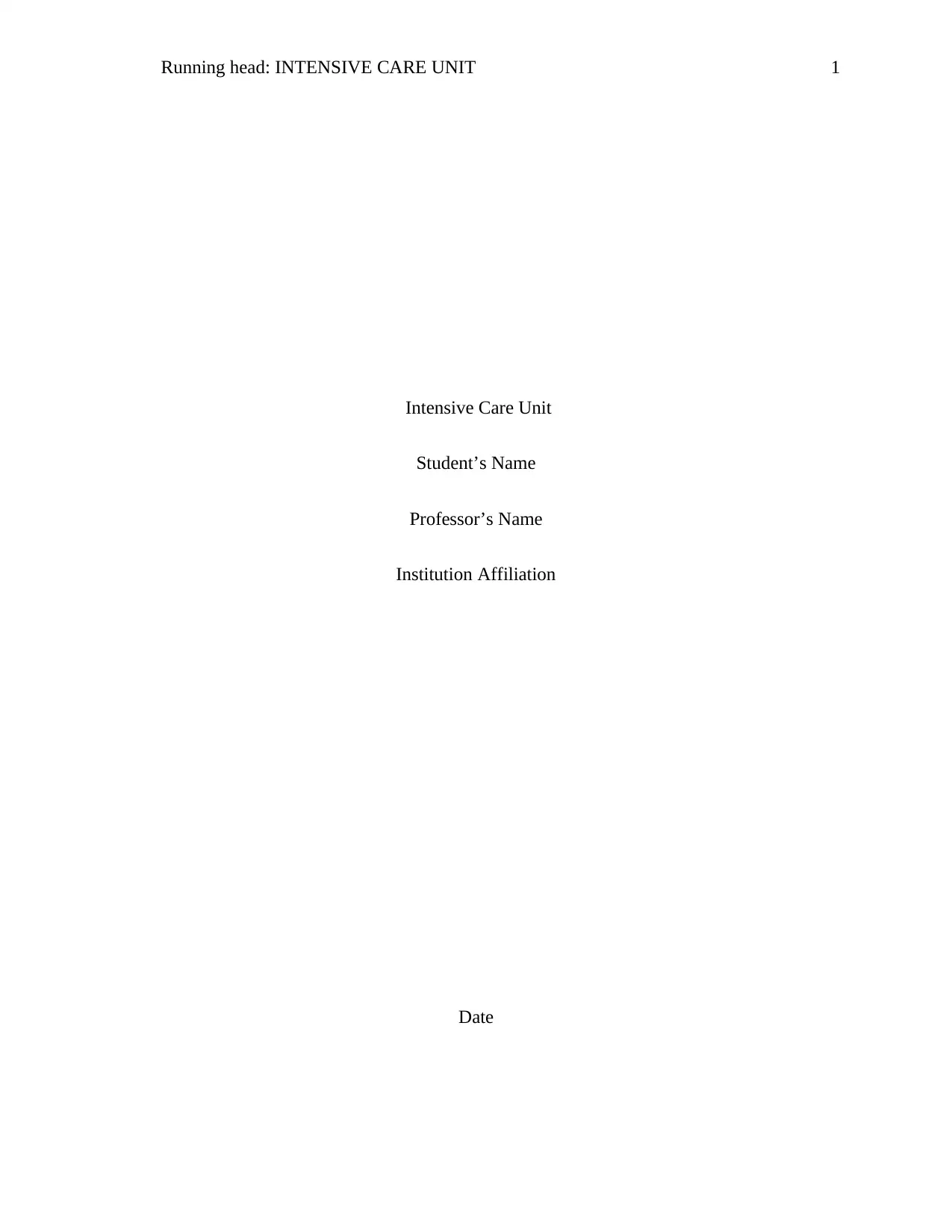
Running head: INTENSIVE CARE UNIT 1
Intensive Care Unit
Student’s Name
Professor’s Name
Institution Affiliation
Date
Intensive Care Unit
Student’s Name
Professor’s Name
Institution Affiliation
Date
Secure Best Marks with AI Grader
Need help grading? Try our AI Grader for instant feedback on your assignments.
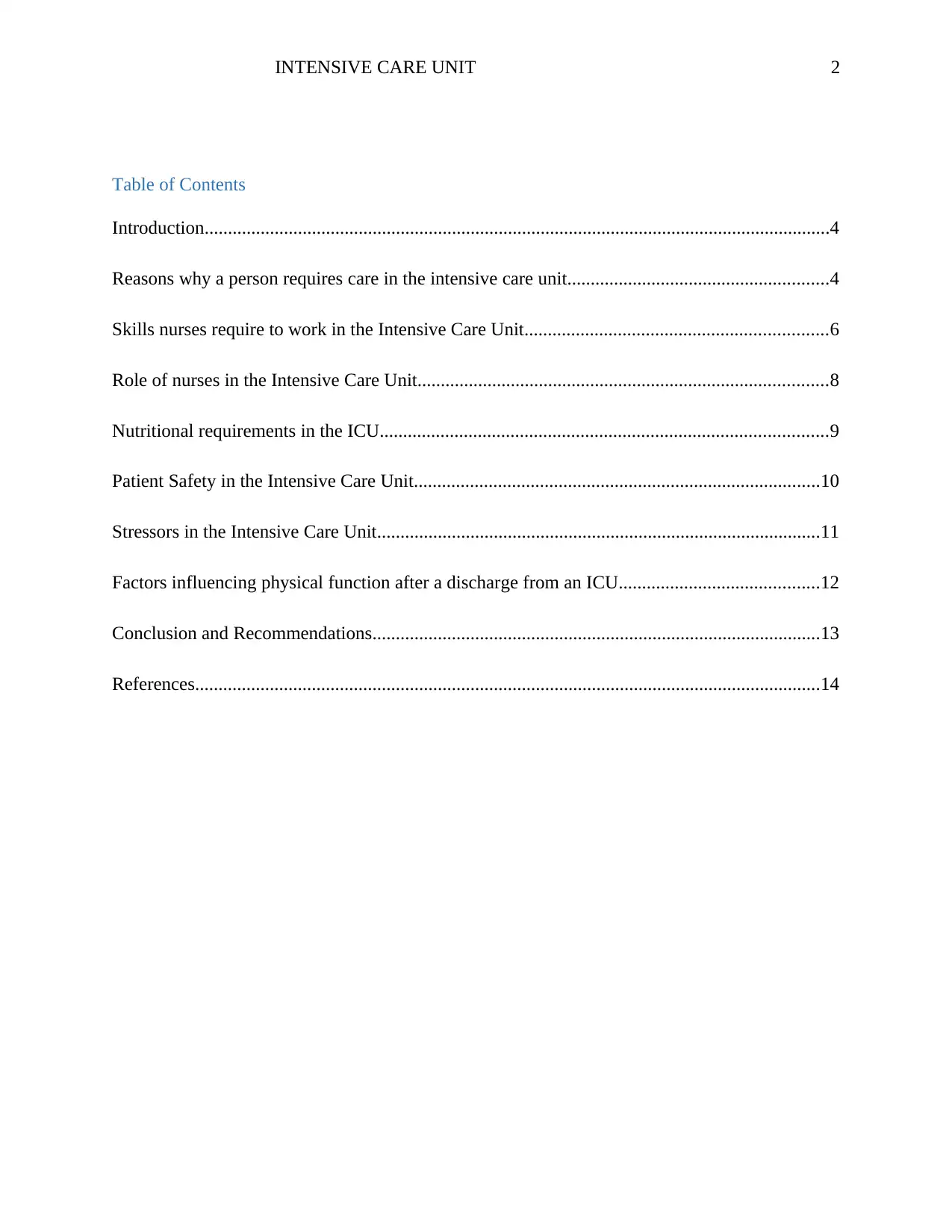
INTENSIVE CARE UNIT 2
Table of Contents
Introduction......................................................................................................................................4
Reasons why a person requires care in the intensive care unit........................................................4
Skills nurses require to work in the Intensive Care Unit.................................................................6
Role of nurses in the Intensive Care Unit........................................................................................8
Nutritional requirements in the ICU................................................................................................9
Patient Safety in the Intensive Care Unit.......................................................................................10
Stressors in the Intensive Care Unit...............................................................................................11
Factors influencing physical function after a discharge from an ICU...........................................12
Conclusion and Recommendations................................................................................................13
References......................................................................................................................................14
Table of Contents
Introduction......................................................................................................................................4
Reasons why a person requires care in the intensive care unit........................................................4
Skills nurses require to work in the Intensive Care Unit.................................................................6
Role of nurses in the Intensive Care Unit........................................................................................8
Nutritional requirements in the ICU................................................................................................9
Patient Safety in the Intensive Care Unit.......................................................................................10
Stressors in the Intensive Care Unit...............................................................................................11
Factors influencing physical function after a discharge from an ICU...........................................12
Conclusion and Recommendations................................................................................................13
References......................................................................................................................................14
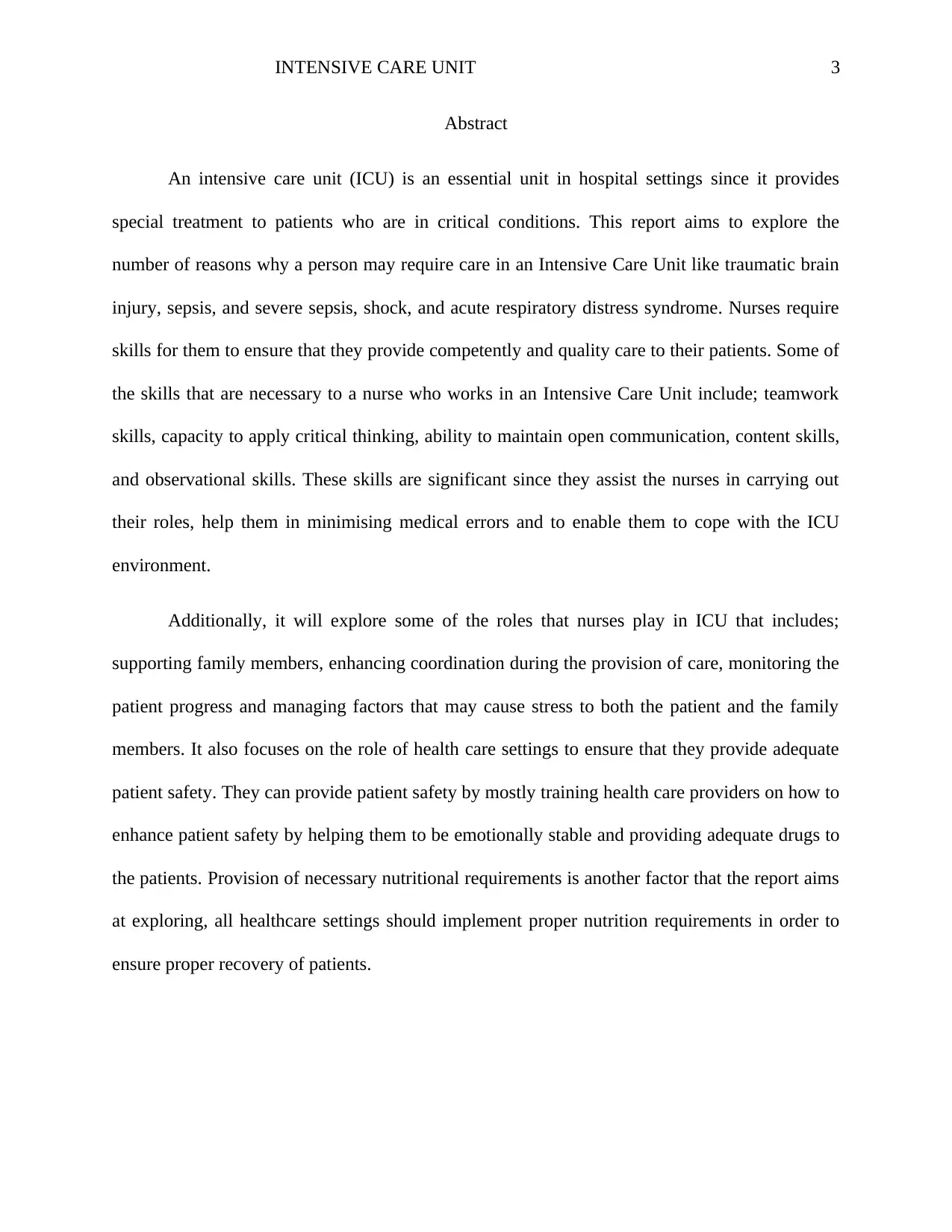
INTENSIVE CARE UNIT 3
Abstract
An intensive care unit (ICU) is an essential unit in hospital settings since it provides
special treatment to patients who are in critical conditions. This report aims to explore the
number of reasons why a person may require care in an Intensive Care Unit like traumatic brain
injury, sepsis, and severe sepsis, shock, and acute respiratory distress syndrome. Nurses require
skills for them to ensure that they provide competently and quality care to their patients. Some of
the skills that are necessary to a nurse who works in an Intensive Care Unit include; teamwork
skills, capacity to apply critical thinking, ability to maintain open communication, content skills,
and observational skills. These skills are significant since they assist the nurses in carrying out
their roles, help them in minimising medical errors and to enable them to cope with the ICU
environment.
Additionally, it will explore some of the roles that nurses play in ICU that includes;
supporting family members, enhancing coordination during the provision of care, monitoring the
patient progress and managing factors that may cause stress to both the patient and the family
members. It also focuses on the role of health care settings to ensure that they provide adequate
patient safety. They can provide patient safety by mostly training health care providers on how to
enhance patient safety by helping them to be emotionally stable and providing adequate drugs to
the patients. Provision of necessary nutritional requirements is another factor that the report aims
at exploring, all healthcare settings should implement proper nutrition requirements in order to
ensure proper recovery of patients.
Abstract
An intensive care unit (ICU) is an essential unit in hospital settings since it provides
special treatment to patients who are in critical conditions. This report aims to explore the
number of reasons why a person may require care in an Intensive Care Unit like traumatic brain
injury, sepsis, and severe sepsis, shock, and acute respiratory distress syndrome. Nurses require
skills for them to ensure that they provide competently and quality care to their patients. Some of
the skills that are necessary to a nurse who works in an Intensive Care Unit include; teamwork
skills, capacity to apply critical thinking, ability to maintain open communication, content skills,
and observational skills. These skills are significant since they assist the nurses in carrying out
their roles, help them in minimising medical errors and to enable them to cope with the ICU
environment.
Additionally, it will explore some of the roles that nurses play in ICU that includes;
supporting family members, enhancing coordination during the provision of care, monitoring the
patient progress and managing factors that may cause stress to both the patient and the family
members. It also focuses on the role of health care settings to ensure that they provide adequate
patient safety. They can provide patient safety by mostly training health care providers on how to
enhance patient safety by helping them to be emotionally stable and providing adequate drugs to
the patients. Provision of necessary nutritional requirements is another factor that the report aims
at exploring, all healthcare settings should implement proper nutrition requirements in order to
ensure proper recovery of patients.
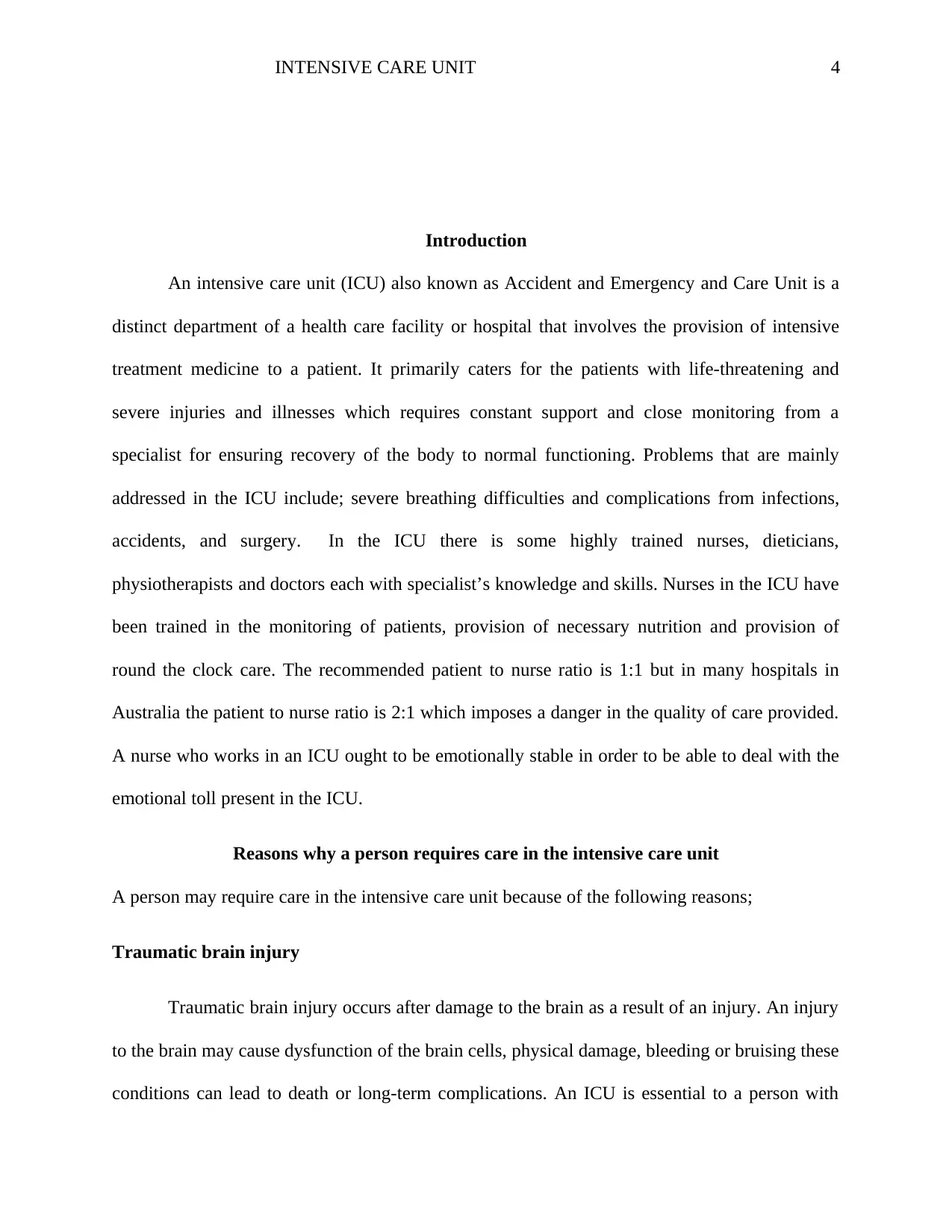
INTENSIVE CARE UNIT 4
Introduction
An intensive care unit (ICU) also known as Accident and Emergency and Care Unit is a
distinct department of a health care facility or hospital that involves the provision of intensive
treatment medicine to a patient. It primarily caters for the patients with life-threatening and
severe injuries and illnesses which requires constant support and close monitoring from a
specialist for ensuring recovery of the body to normal functioning. Problems that are mainly
addressed in the ICU include; severe breathing difficulties and complications from infections,
accidents, and surgery. In the ICU there is some highly trained nurses, dieticians,
physiotherapists and doctors each with specialist’s knowledge and skills. Nurses in the ICU have
been trained in the monitoring of patients, provision of necessary nutrition and provision of
round the clock care. The recommended patient to nurse ratio is 1:1 but in many hospitals in
Australia the patient to nurse ratio is 2:1 which imposes a danger in the quality of care provided.
A nurse who works in an ICU ought to be emotionally stable in order to be able to deal with the
emotional toll present in the ICU.
Reasons why a person requires care in the intensive care unit
A person may require care in the intensive care unit because of the following reasons;
Traumatic brain injury
Traumatic brain injury occurs after damage to the brain as a result of an injury. An injury
to the brain may cause dysfunction of the brain cells, physical damage, bleeding or bruising these
conditions can lead to death or long-term complications. An ICU is essential to a person with
Introduction
An intensive care unit (ICU) also known as Accident and Emergency and Care Unit is a
distinct department of a health care facility or hospital that involves the provision of intensive
treatment medicine to a patient. It primarily caters for the patients with life-threatening and
severe injuries and illnesses which requires constant support and close monitoring from a
specialist for ensuring recovery of the body to normal functioning. Problems that are mainly
addressed in the ICU include; severe breathing difficulties and complications from infections,
accidents, and surgery. In the ICU there is some highly trained nurses, dieticians,
physiotherapists and doctors each with specialist’s knowledge and skills. Nurses in the ICU have
been trained in the monitoring of patients, provision of necessary nutrition and provision of
round the clock care. The recommended patient to nurse ratio is 1:1 but in many hospitals in
Australia the patient to nurse ratio is 2:1 which imposes a danger in the quality of care provided.
A nurse who works in an ICU ought to be emotionally stable in order to be able to deal with the
emotional toll present in the ICU.
Reasons why a person requires care in the intensive care unit
A person may require care in the intensive care unit because of the following reasons;
Traumatic brain injury
Traumatic brain injury occurs after damage to the brain as a result of an injury. An injury
to the brain may cause dysfunction of the brain cells, physical damage, bleeding or bruising these
conditions can lead to death or long-term complications. An ICU is essential to a person with
Paraphrase This Document
Need a fresh take? Get an instant paraphrase of this document with our AI Paraphraser
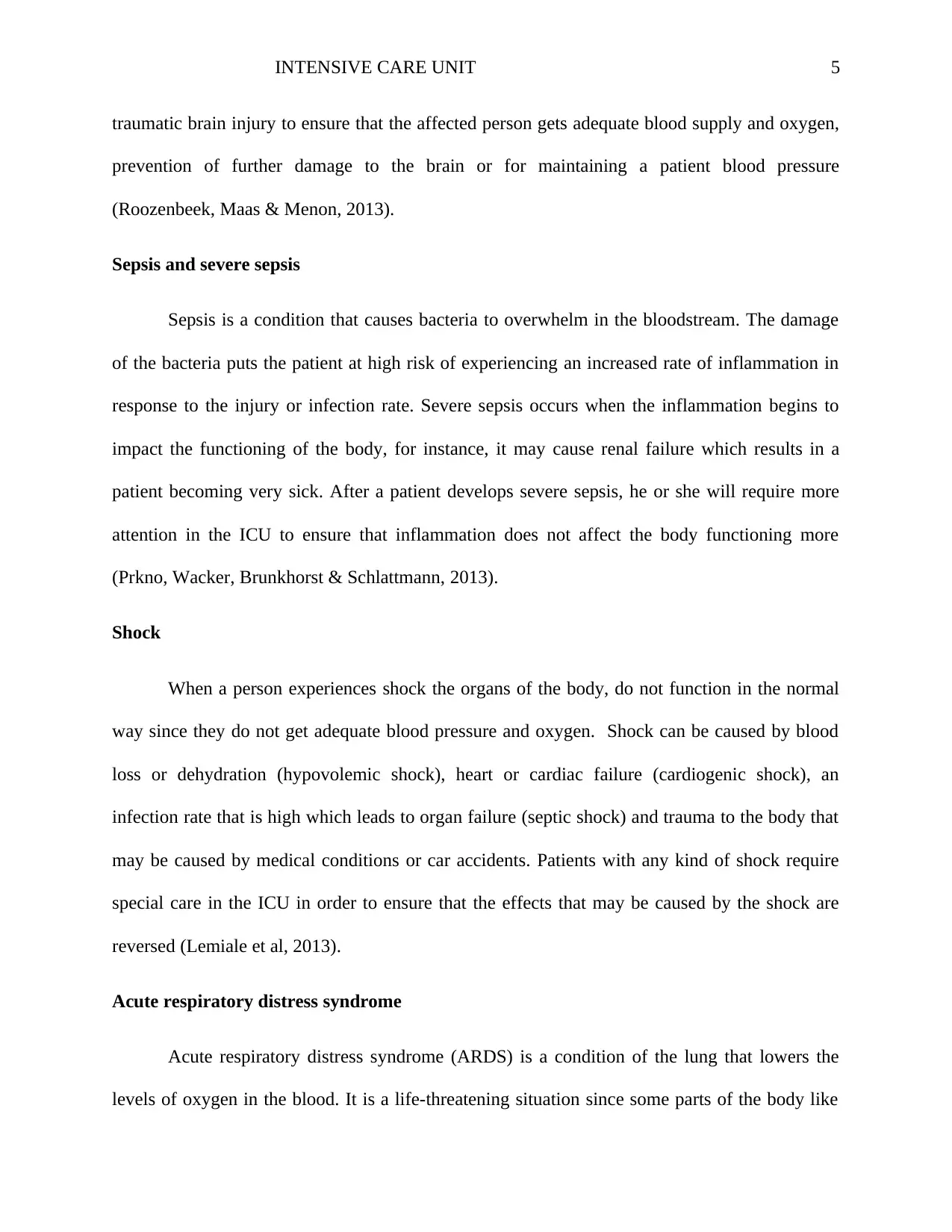
INTENSIVE CARE UNIT 5
traumatic brain injury to ensure that the affected person gets adequate blood supply and oxygen,
prevention of further damage to the brain or for maintaining a patient blood pressure
(Roozenbeek, Maas & Menon, 2013).
Sepsis and severe sepsis
Sepsis is a condition that causes bacteria to overwhelm in the bloodstream. The damage
of the bacteria puts the patient at high risk of experiencing an increased rate of inflammation in
response to the injury or infection rate. Severe sepsis occurs when the inflammation begins to
impact the functioning of the body, for instance, it may cause renal failure which results in a
patient becoming very sick. After a patient develops severe sepsis, he or she will require more
attention in the ICU to ensure that inflammation does not affect the body functioning more
(Prkno, Wacker, Brunkhorst & Schlattmann, 2013).
Shock
When a person experiences shock the organs of the body, do not function in the normal
way since they do not get adequate blood pressure and oxygen. Shock can be caused by blood
loss or dehydration (hypovolemic shock), heart or cardiac failure (cardiogenic shock), an
infection rate that is high which leads to organ failure (septic shock) and trauma to the body that
may be caused by medical conditions or car accidents. Patients with any kind of shock require
special care in the ICU in order to ensure that the effects that may be caused by the shock are
reversed (Lemiale et al, 2013).
Acute respiratory distress syndrome
Acute respiratory distress syndrome (ARDS) is a condition of the lung that lowers the
levels of oxygen in the blood. It is a life-threatening situation since some parts of the body like
traumatic brain injury to ensure that the affected person gets adequate blood supply and oxygen,
prevention of further damage to the brain or for maintaining a patient blood pressure
(Roozenbeek, Maas & Menon, 2013).
Sepsis and severe sepsis
Sepsis is a condition that causes bacteria to overwhelm in the bloodstream. The damage
of the bacteria puts the patient at high risk of experiencing an increased rate of inflammation in
response to the injury or infection rate. Severe sepsis occurs when the inflammation begins to
impact the functioning of the body, for instance, it may cause renal failure which results in a
patient becoming very sick. After a patient develops severe sepsis, he or she will require more
attention in the ICU to ensure that inflammation does not affect the body functioning more
(Prkno, Wacker, Brunkhorst & Schlattmann, 2013).
Shock
When a person experiences shock the organs of the body, do not function in the normal
way since they do not get adequate blood pressure and oxygen. Shock can be caused by blood
loss or dehydration (hypovolemic shock), heart or cardiac failure (cardiogenic shock), an
infection rate that is high which leads to organ failure (septic shock) and trauma to the body that
may be caused by medical conditions or car accidents. Patients with any kind of shock require
special care in the ICU in order to ensure that the effects that may be caused by the shock are
reversed (Lemiale et al, 2013).
Acute respiratory distress syndrome
Acute respiratory distress syndrome (ARDS) is a condition of the lung that lowers the
levels of oxygen in the blood. It is a life-threatening situation since some parts of the body like
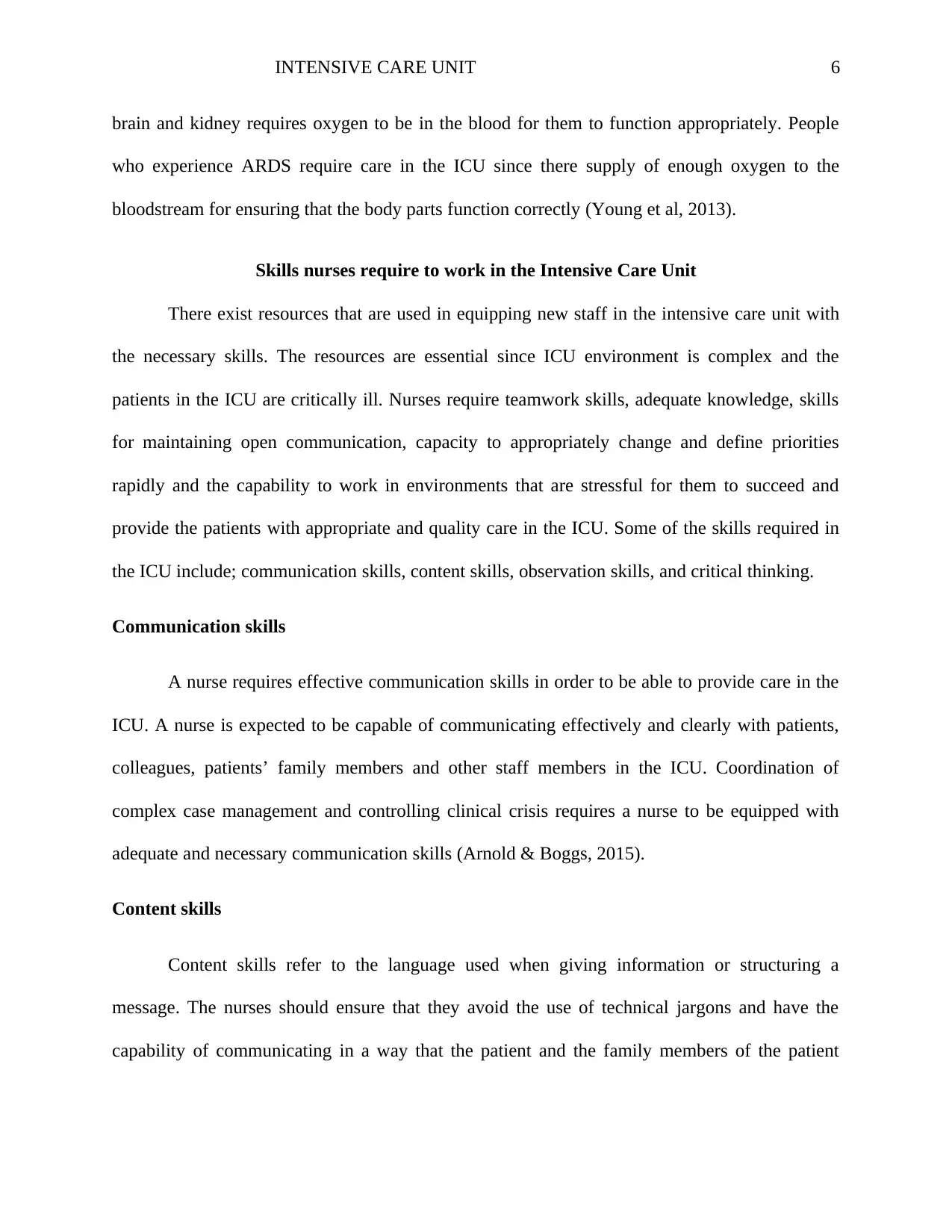
INTENSIVE CARE UNIT 6
brain and kidney requires oxygen to be in the blood for them to function appropriately. People
who experience ARDS require care in the ICU since there supply of enough oxygen to the
bloodstream for ensuring that the body parts function correctly (Young et al, 2013).
Skills nurses require to work in the Intensive Care Unit
There exist resources that are used in equipping new staff in the intensive care unit with
the necessary skills. The resources are essential since ICU environment is complex and the
patients in the ICU are critically ill. Nurses require teamwork skills, adequate knowledge, skills
for maintaining open communication, capacity to appropriately change and define priorities
rapidly and the capability to work in environments that are stressful for them to succeed and
provide the patients with appropriate and quality care in the ICU. Some of the skills required in
the ICU include; communication skills, content skills, observation skills, and critical thinking.
Communication skills
A nurse requires effective communication skills in order to be able to provide care in the
ICU. A nurse is expected to be capable of communicating effectively and clearly with patients,
colleagues, patients’ family members and other staff members in the ICU. Coordination of
complex case management and controlling clinical crisis requires a nurse to be equipped with
adequate and necessary communication skills (Arnold & Boggs, 2015).
Content skills
Content skills refer to the language used when giving information or structuring a
message. The nurses should ensure that they avoid the use of technical jargons and have the
capability of communicating in a way that the patient and the family members of the patient
brain and kidney requires oxygen to be in the blood for them to function appropriately. People
who experience ARDS require care in the ICU since there supply of enough oxygen to the
bloodstream for ensuring that the body parts function correctly (Young et al, 2013).
Skills nurses require to work in the Intensive Care Unit
There exist resources that are used in equipping new staff in the intensive care unit with
the necessary skills. The resources are essential since ICU environment is complex and the
patients in the ICU are critically ill. Nurses require teamwork skills, adequate knowledge, skills
for maintaining open communication, capacity to appropriately change and define priorities
rapidly and the capability to work in environments that are stressful for them to succeed and
provide the patients with appropriate and quality care in the ICU. Some of the skills required in
the ICU include; communication skills, content skills, observation skills, and critical thinking.
Communication skills
A nurse requires effective communication skills in order to be able to provide care in the
ICU. A nurse is expected to be capable of communicating effectively and clearly with patients,
colleagues, patients’ family members and other staff members in the ICU. Coordination of
complex case management and controlling clinical crisis requires a nurse to be equipped with
adequate and necessary communication skills (Arnold & Boggs, 2015).
Content skills
Content skills refer to the language used when giving information or structuring a
message. The nurses should ensure that they avoid the use of technical jargons and have the
capability of communicating in a way that the patient and the family members of the patient
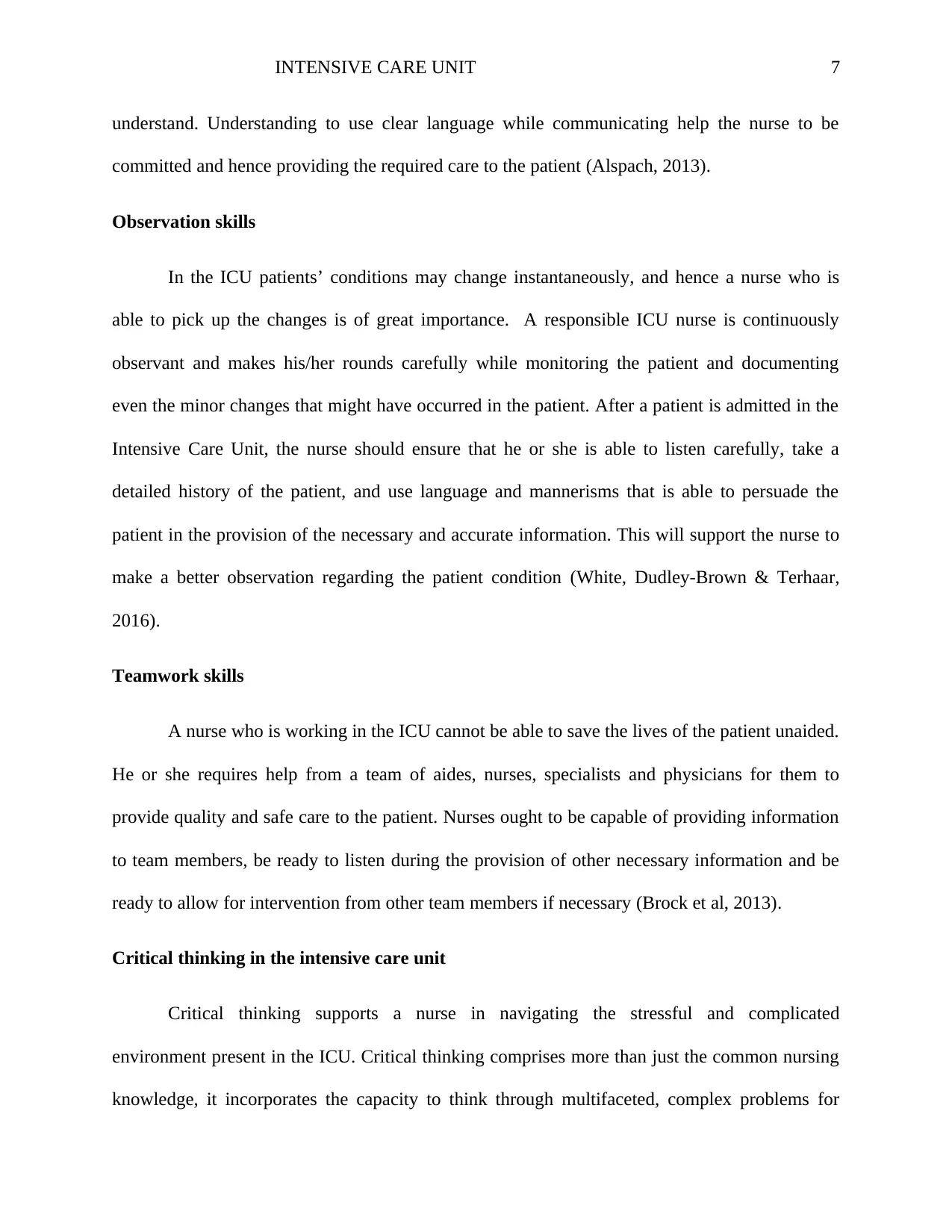
INTENSIVE CARE UNIT 7
understand. Understanding to use clear language while communicating help the nurse to be
committed and hence providing the required care to the patient (Alspach, 2013).
Observation skills
In the ICU patients’ conditions may change instantaneously, and hence a nurse who is
able to pick up the changes is of great importance. A responsible ICU nurse is continuously
observant and makes his/her rounds carefully while monitoring the patient and documenting
even the minor changes that might have occurred in the patient. After a patient is admitted in the
Intensive Care Unit, the nurse should ensure that he or she is able to listen carefully, take a
detailed history of the patient, and use language and mannerisms that is able to persuade the
patient in the provision of the necessary and accurate information. This will support the nurse to
make a better observation regarding the patient condition (White, Dudley-Brown & Terhaar,
2016).
Teamwork skills
A nurse who is working in the ICU cannot be able to save the lives of the patient unaided.
He or she requires help from a team of aides, nurses, specialists and physicians for them to
provide quality and safe care to the patient. Nurses ought to be capable of providing information
to team members, be ready to listen during the provision of other necessary information and be
ready to allow for intervention from other team members if necessary (Brock et al, 2013).
Critical thinking in the intensive care unit
Critical thinking supports a nurse in navigating the stressful and complicated
environment present in the ICU. Critical thinking comprises more than just the common nursing
knowledge, it incorporates the capacity to think through multifaceted, complex problems for
understand. Understanding to use clear language while communicating help the nurse to be
committed and hence providing the required care to the patient (Alspach, 2013).
Observation skills
In the ICU patients’ conditions may change instantaneously, and hence a nurse who is
able to pick up the changes is of great importance. A responsible ICU nurse is continuously
observant and makes his/her rounds carefully while monitoring the patient and documenting
even the minor changes that might have occurred in the patient. After a patient is admitted in the
Intensive Care Unit, the nurse should ensure that he or she is able to listen carefully, take a
detailed history of the patient, and use language and mannerisms that is able to persuade the
patient in the provision of the necessary and accurate information. This will support the nurse to
make a better observation regarding the patient condition (White, Dudley-Brown & Terhaar,
2016).
Teamwork skills
A nurse who is working in the ICU cannot be able to save the lives of the patient unaided.
He or she requires help from a team of aides, nurses, specialists and physicians for them to
provide quality and safe care to the patient. Nurses ought to be capable of providing information
to team members, be ready to listen during the provision of other necessary information and be
ready to allow for intervention from other team members if necessary (Brock et al, 2013).
Critical thinking in the intensive care unit
Critical thinking supports a nurse in navigating the stressful and complicated
environment present in the ICU. Critical thinking comprises more than just the common nursing
knowledge, it incorporates the capacity to think through multifaceted, complex problems for
Secure Best Marks with AI Grader
Need help grading? Try our AI Grader for instant feedback on your assignments.
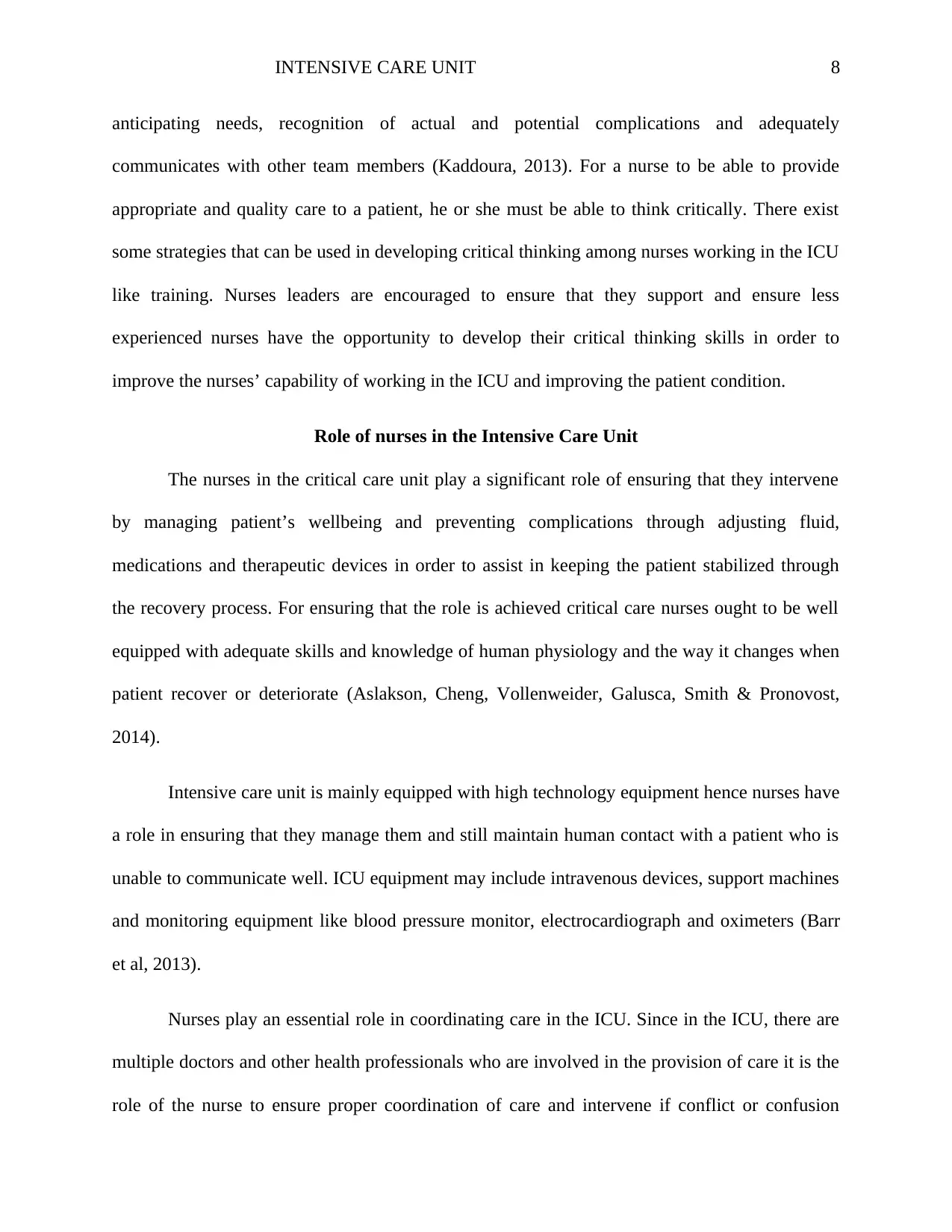
INTENSIVE CARE UNIT 8
anticipating needs, recognition of actual and potential complications and adequately
communicates with other team members (Kaddoura, 2013). For a nurse to be able to provide
appropriate and quality care to a patient, he or she must be able to think critically. There exist
some strategies that can be used in developing critical thinking among nurses working in the ICU
like training. Nurses leaders are encouraged to ensure that they support and ensure less
experienced nurses have the opportunity to develop their critical thinking skills in order to
improve the nurses’ capability of working in the ICU and improving the patient condition.
Role of nurses in the Intensive Care Unit
The nurses in the critical care unit play a significant role of ensuring that they intervene
by managing patient’s wellbeing and preventing complications through adjusting fluid,
medications and therapeutic devices in order to assist in keeping the patient stabilized through
the recovery process. For ensuring that the role is achieved critical care nurses ought to be well
equipped with adequate skills and knowledge of human physiology and the way it changes when
patient recover or deteriorate (Aslakson, Cheng, Vollenweider, Galusca, Smith & Pronovost,
2014).
Intensive care unit is mainly equipped with high technology equipment hence nurses have
a role in ensuring that they manage them and still maintain human contact with a patient who is
unable to communicate well. ICU equipment may include intravenous devices, support machines
and monitoring equipment like blood pressure monitor, electrocardiograph and oximeters (Barr
et al, 2013).
Nurses play an essential role in coordinating care in the ICU. Since in the ICU, there are
multiple doctors and other health professionals who are involved in the provision of care it is the
role of the nurse to ensure proper coordination of care and intervene if conflict or confusion
anticipating needs, recognition of actual and potential complications and adequately
communicates with other team members (Kaddoura, 2013). For a nurse to be able to provide
appropriate and quality care to a patient, he or she must be able to think critically. There exist
some strategies that can be used in developing critical thinking among nurses working in the ICU
like training. Nurses leaders are encouraged to ensure that they support and ensure less
experienced nurses have the opportunity to develop their critical thinking skills in order to
improve the nurses’ capability of working in the ICU and improving the patient condition.
Role of nurses in the Intensive Care Unit
The nurses in the critical care unit play a significant role of ensuring that they intervene
by managing patient’s wellbeing and preventing complications through adjusting fluid,
medications and therapeutic devices in order to assist in keeping the patient stabilized through
the recovery process. For ensuring that the role is achieved critical care nurses ought to be well
equipped with adequate skills and knowledge of human physiology and the way it changes when
patient recover or deteriorate (Aslakson, Cheng, Vollenweider, Galusca, Smith & Pronovost,
2014).
Intensive care unit is mainly equipped with high technology equipment hence nurses have
a role in ensuring that they manage them and still maintain human contact with a patient who is
unable to communicate well. ICU equipment may include intravenous devices, support machines
and monitoring equipment like blood pressure monitor, electrocardiograph and oximeters (Barr
et al, 2013).
Nurses play an essential role in coordinating care in the ICU. Since in the ICU, there are
multiple doctors and other health professionals who are involved in the provision of care it is the
role of the nurse to ensure proper coordination of care and intervene if conflict or confusion
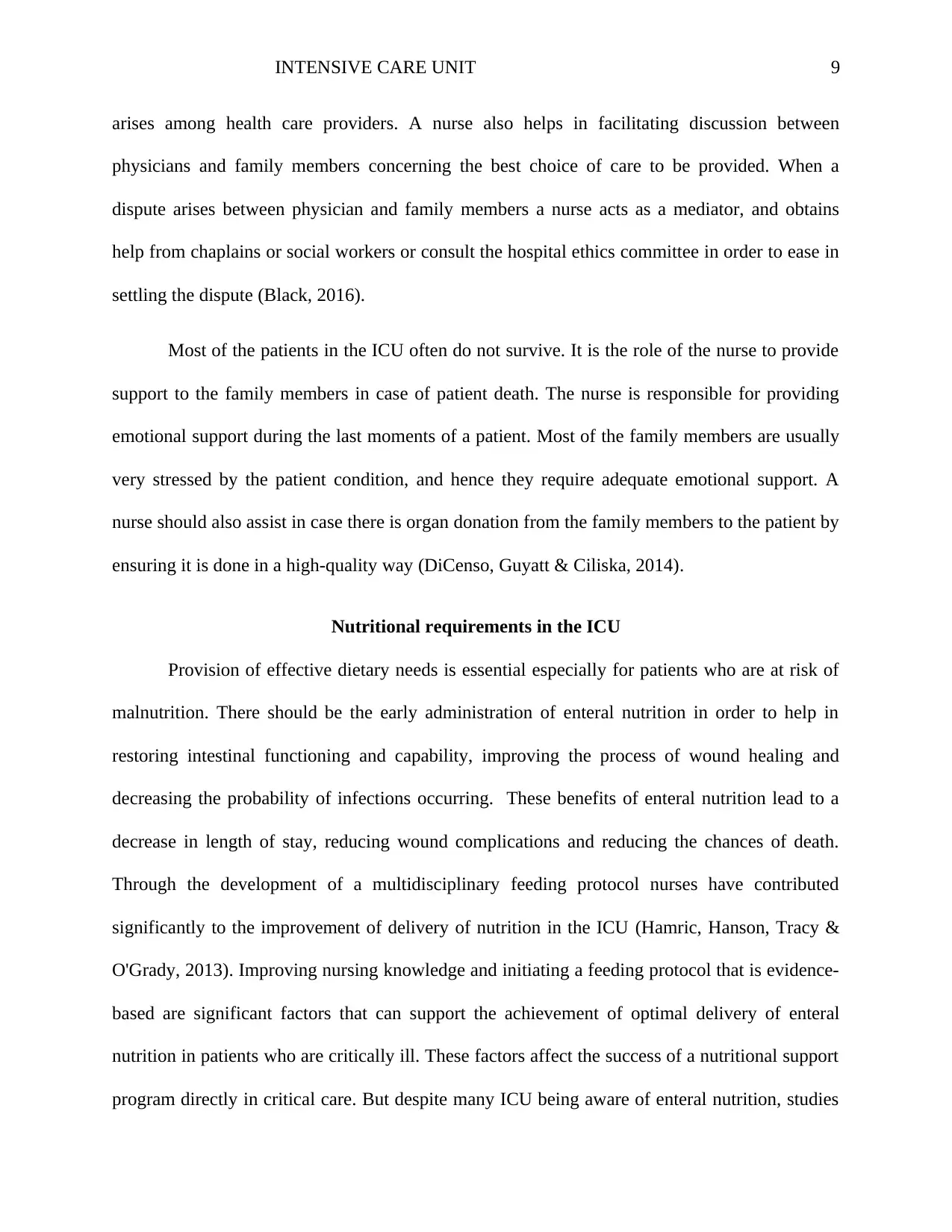
INTENSIVE CARE UNIT 9
arises among health care providers. A nurse also helps in facilitating discussion between
physicians and family members concerning the best choice of care to be provided. When a
dispute arises between physician and family members a nurse acts as a mediator, and obtains
help from chaplains or social workers or consult the hospital ethics committee in order to ease in
settling the dispute (Black, 2016).
Most of the patients in the ICU often do not survive. It is the role of the nurse to provide
support to the family members in case of patient death. The nurse is responsible for providing
emotional support during the last moments of a patient. Most of the family members are usually
very stressed by the patient condition, and hence they require adequate emotional support. A
nurse should also assist in case there is organ donation from the family members to the patient by
ensuring it is done in a high-quality way (DiCenso, Guyatt & Ciliska, 2014).
Nutritional requirements in the ICU
Provision of effective dietary needs is essential especially for patients who are at risk of
malnutrition. There should be the early administration of enteral nutrition in order to help in
restoring intestinal functioning and capability, improving the process of wound healing and
decreasing the probability of infections occurring. These benefits of enteral nutrition lead to a
decrease in length of stay, reducing wound complications and reducing the chances of death.
Through the development of a multidisciplinary feeding protocol nurses have contributed
significantly to the improvement of delivery of nutrition in the ICU (Hamric, Hanson, Tracy &
O'Grady, 2013). Improving nursing knowledge and initiating a feeding protocol that is evidence-
based are significant factors that can support the achievement of optimal delivery of enteral
nutrition in patients who are critically ill. These factors affect the success of a nutritional support
program directly in critical care. But despite many ICU being aware of enteral nutrition, studies
arises among health care providers. A nurse also helps in facilitating discussion between
physicians and family members concerning the best choice of care to be provided. When a
dispute arises between physician and family members a nurse acts as a mediator, and obtains
help from chaplains or social workers or consult the hospital ethics committee in order to ease in
settling the dispute (Black, 2016).
Most of the patients in the ICU often do not survive. It is the role of the nurse to provide
support to the family members in case of patient death. The nurse is responsible for providing
emotional support during the last moments of a patient. Most of the family members are usually
very stressed by the patient condition, and hence they require adequate emotional support. A
nurse should also assist in case there is organ donation from the family members to the patient by
ensuring it is done in a high-quality way (DiCenso, Guyatt & Ciliska, 2014).
Nutritional requirements in the ICU
Provision of effective dietary needs is essential especially for patients who are at risk of
malnutrition. There should be the early administration of enteral nutrition in order to help in
restoring intestinal functioning and capability, improving the process of wound healing and
decreasing the probability of infections occurring. These benefits of enteral nutrition lead to a
decrease in length of stay, reducing wound complications and reducing the chances of death.
Through the development of a multidisciplinary feeding protocol nurses have contributed
significantly to the improvement of delivery of nutrition in the ICU (Hamric, Hanson, Tracy &
O'Grady, 2013). Improving nursing knowledge and initiating a feeding protocol that is evidence-
based are significant factors that can support the achievement of optimal delivery of enteral
nutrition in patients who are critically ill. These factors affect the success of a nutritional support
program directly in critical care. But despite many ICU being aware of enteral nutrition, studies
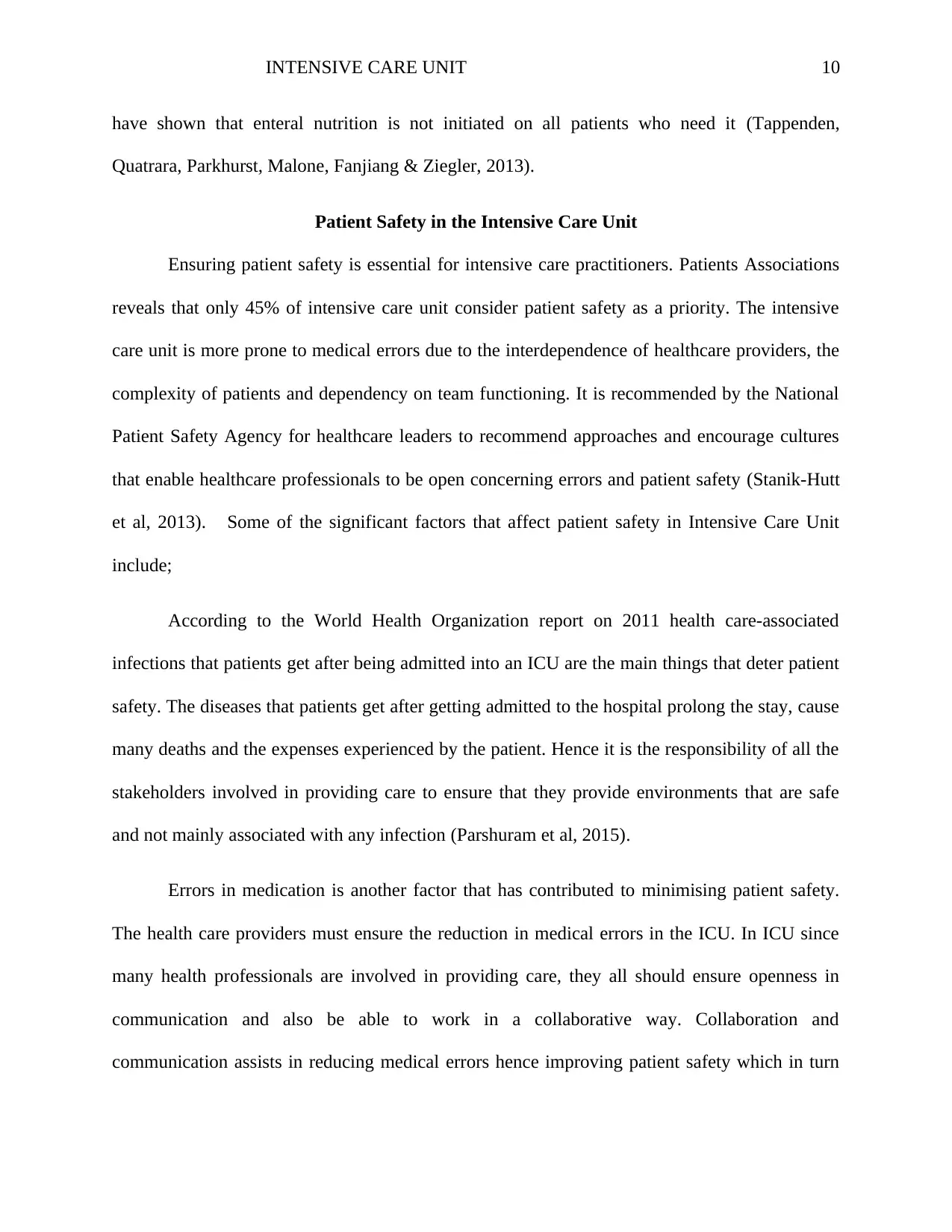
INTENSIVE CARE UNIT 10
have shown that enteral nutrition is not initiated on all patients who need it (Tappenden,
Quatrara, Parkhurst, Malone, Fanjiang & Ziegler, 2013).
Patient Safety in the Intensive Care Unit
Ensuring patient safety is essential for intensive care practitioners. Patients Associations
reveals that only 45% of intensive care unit consider patient safety as a priority. The intensive
care unit is more prone to medical errors due to the interdependence of healthcare providers, the
complexity of patients and dependency on team functioning. It is recommended by the National
Patient Safety Agency for healthcare leaders to recommend approaches and encourage cultures
that enable healthcare professionals to be open concerning errors and patient safety (Stanik-Hutt
et al, 2013). Some of the significant factors that affect patient safety in Intensive Care Unit
include;
According to the World Health Organization report on 2011 health care-associated
infections that patients get after being admitted into an ICU are the main things that deter patient
safety. The diseases that patients get after getting admitted to the hospital prolong the stay, cause
many deaths and the expenses experienced by the patient. Hence it is the responsibility of all the
stakeholders involved in providing care to ensure that they provide environments that are safe
and not mainly associated with any infection (Parshuram et al, 2015).
Errors in medication is another factor that has contributed to minimising patient safety.
The health care providers must ensure the reduction in medical errors in the ICU. In ICU since
many health professionals are involved in providing care, they all should ensure openness in
communication and also be able to work in a collaborative way. Collaboration and
communication assists in reducing medical errors hence improving patient safety which in turn
have shown that enteral nutrition is not initiated on all patients who need it (Tappenden,
Quatrara, Parkhurst, Malone, Fanjiang & Ziegler, 2013).
Patient Safety in the Intensive Care Unit
Ensuring patient safety is essential for intensive care practitioners. Patients Associations
reveals that only 45% of intensive care unit consider patient safety as a priority. The intensive
care unit is more prone to medical errors due to the interdependence of healthcare providers, the
complexity of patients and dependency on team functioning. It is recommended by the National
Patient Safety Agency for healthcare leaders to recommend approaches and encourage cultures
that enable healthcare professionals to be open concerning errors and patient safety (Stanik-Hutt
et al, 2013). Some of the significant factors that affect patient safety in Intensive Care Unit
include;
According to the World Health Organization report on 2011 health care-associated
infections that patients get after being admitted into an ICU are the main things that deter patient
safety. The diseases that patients get after getting admitted to the hospital prolong the stay, cause
many deaths and the expenses experienced by the patient. Hence it is the responsibility of all the
stakeholders involved in providing care to ensure that they provide environments that are safe
and not mainly associated with any infection (Parshuram et al, 2015).
Errors in medication is another factor that has contributed to minimising patient safety.
The health care providers must ensure the reduction in medical errors in the ICU. In ICU since
many health professionals are involved in providing care, they all should ensure openness in
communication and also be able to work in a collaborative way. Collaboration and
communication assists in reducing medical errors hence improving patient safety which in turn
Paraphrase This Document
Need a fresh take? Get an instant paraphrase of this document with our AI Paraphraser
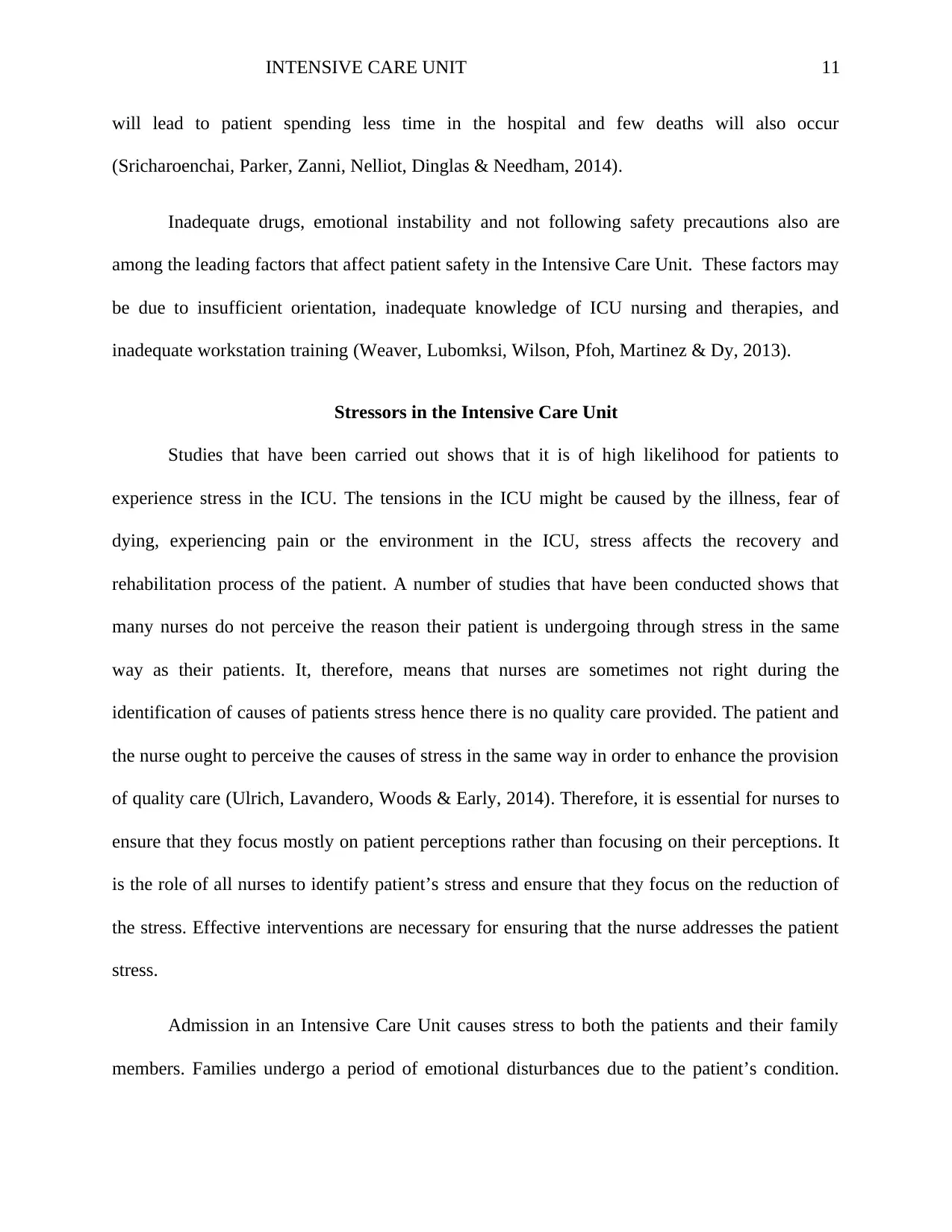
INTENSIVE CARE UNIT 11
will lead to patient spending less time in the hospital and few deaths will also occur
(Sricharoenchai, Parker, Zanni, Nelliot, Dinglas & Needham, 2014).
Inadequate drugs, emotional instability and not following safety precautions also are
among the leading factors that affect patient safety in the Intensive Care Unit. These factors may
be due to insufficient orientation, inadequate knowledge of ICU nursing and therapies, and
inadequate workstation training (Weaver, Lubomksi, Wilson, Pfoh, Martinez & Dy, 2013).
Stressors in the Intensive Care Unit
Studies that have been carried out shows that it is of high likelihood for patients to
experience stress in the ICU. The tensions in the ICU might be caused by the illness, fear of
dying, experiencing pain or the environment in the ICU, stress affects the recovery and
rehabilitation process of the patient. A number of studies that have been conducted shows that
many nurses do not perceive the reason their patient is undergoing through stress in the same
way as their patients. It, therefore, means that nurses are sometimes not right during the
identification of causes of patients stress hence there is no quality care provided. The patient and
the nurse ought to perceive the causes of stress in the same way in order to enhance the provision
of quality care (Ulrich, Lavandero, Woods & Early, 2014). Therefore, it is essential for nurses to
ensure that they focus mostly on patient perceptions rather than focusing on their perceptions. It
is the role of all nurses to identify patient’s stress and ensure that they focus on the reduction of
the stress. Effective interventions are necessary for ensuring that the nurse addresses the patient
stress.
Admission in an Intensive Care Unit causes stress to both the patients and their family
members. Families undergo a period of emotional disturbances due to the patient’s condition.
will lead to patient spending less time in the hospital and few deaths will also occur
(Sricharoenchai, Parker, Zanni, Nelliot, Dinglas & Needham, 2014).
Inadequate drugs, emotional instability and not following safety precautions also are
among the leading factors that affect patient safety in the Intensive Care Unit. These factors may
be due to insufficient orientation, inadequate knowledge of ICU nursing and therapies, and
inadequate workstation training (Weaver, Lubomksi, Wilson, Pfoh, Martinez & Dy, 2013).
Stressors in the Intensive Care Unit
Studies that have been carried out shows that it is of high likelihood for patients to
experience stress in the ICU. The tensions in the ICU might be caused by the illness, fear of
dying, experiencing pain or the environment in the ICU, stress affects the recovery and
rehabilitation process of the patient. A number of studies that have been conducted shows that
many nurses do not perceive the reason their patient is undergoing through stress in the same
way as their patients. It, therefore, means that nurses are sometimes not right during the
identification of causes of patients stress hence there is no quality care provided. The patient and
the nurse ought to perceive the causes of stress in the same way in order to enhance the provision
of quality care (Ulrich, Lavandero, Woods & Early, 2014). Therefore, it is essential for nurses to
ensure that they focus mostly on patient perceptions rather than focusing on their perceptions. It
is the role of all nurses to identify patient’s stress and ensure that they focus on the reduction of
the stress. Effective interventions are necessary for ensuring that the nurse addresses the patient
stress.
Admission in an Intensive Care Unit causes stress to both the patients and their family
members. Families undergo a period of emotional disturbances due to the patient’s condition.
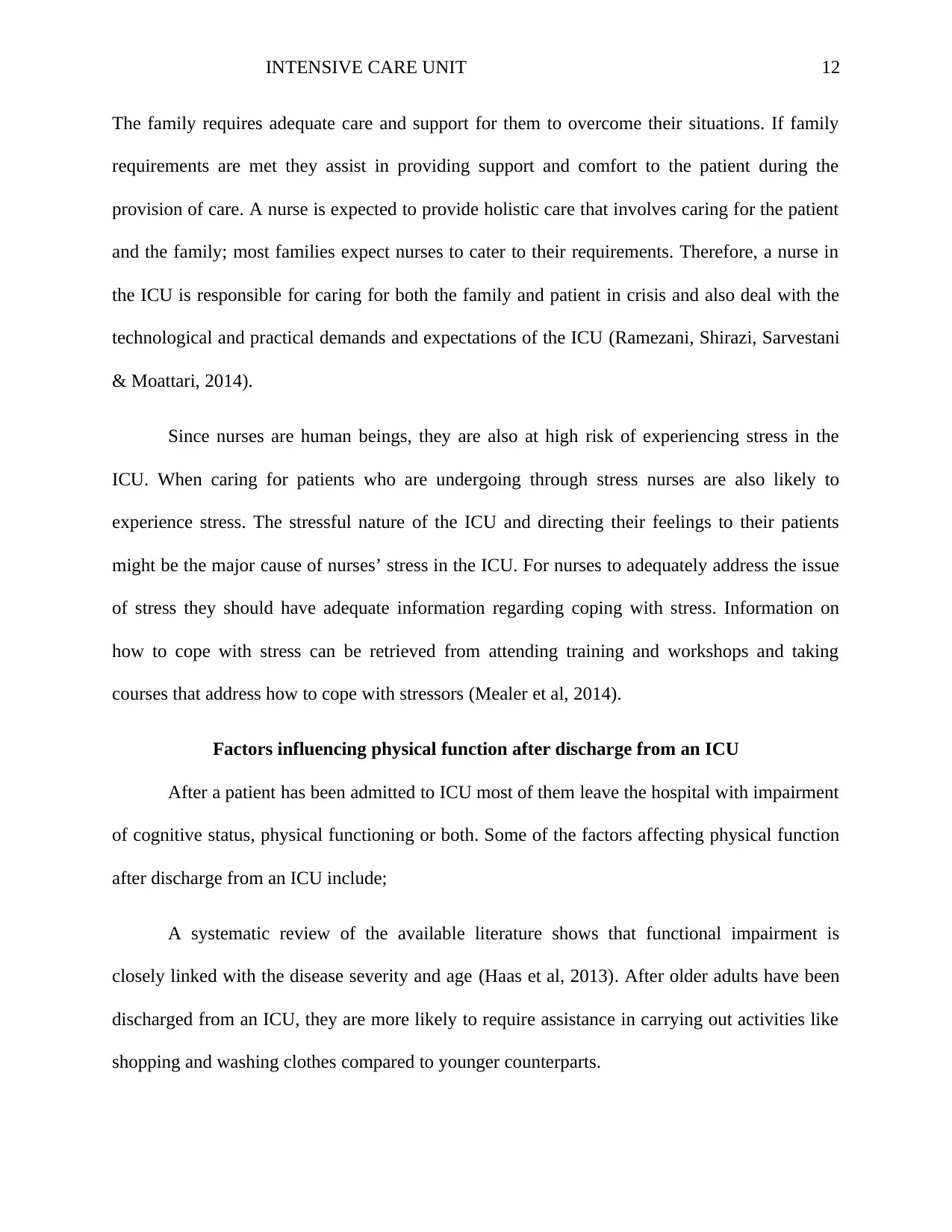
INTENSIVE CARE UNIT 12
The family requires adequate care and support for them to overcome their situations. If family
requirements are met they assist in providing support and comfort to the patient during the
provision of care. A nurse is expected to provide holistic care that involves caring for the patient
and the family; most families expect nurses to cater to their requirements. Therefore, a nurse in
the ICU is responsible for caring for both the family and patient in crisis and also deal with the
technological and practical demands and expectations of the ICU (Ramezani, Shirazi, Sarvestani
& Moattari, 2014).
Since nurses are human beings, they are also at high risk of experiencing stress in the
ICU. When caring for patients who are undergoing through stress nurses are also likely to
experience stress. The stressful nature of the ICU and directing their feelings to their patients
might be the major cause of nurses’ stress in the ICU. For nurses to adequately address the issue
of stress they should have adequate information regarding coping with stress. Information on
how to cope with stress can be retrieved from attending training and workshops and taking
courses that address how to cope with stressors (Mealer et al, 2014).
Factors influencing physical function after discharge from an ICU
After a patient has been admitted to ICU most of them leave the hospital with impairment
of cognitive status, physical functioning or both. Some of the factors affecting physical function
after discharge from an ICU include;
A systematic review of the available literature shows that functional impairment is
closely linked with the disease severity and age (Haas et al, 2013). After older adults have been
discharged from an ICU, they are more likely to require assistance in carrying out activities like
shopping and washing clothes compared to younger counterparts.
The family requires adequate care and support for them to overcome their situations. If family
requirements are met they assist in providing support and comfort to the patient during the
provision of care. A nurse is expected to provide holistic care that involves caring for the patient
and the family; most families expect nurses to cater to their requirements. Therefore, a nurse in
the ICU is responsible for caring for both the family and patient in crisis and also deal with the
technological and practical demands and expectations of the ICU (Ramezani, Shirazi, Sarvestani
& Moattari, 2014).
Since nurses are human beings, they are also at high risk of experiencing stress in the
ICU. When caring for patients who are undergoing through stress nurses are also likely to
experience stress. The stressful nature of the ICU and directing their feelings to their patients
might be the major cause of nurses’ stress in the ICU. For nurses to adequately address the issue
of stress they should have adequate information regarding coping with stress. Information on
how to cope with stress can be retrieved from attending training and workshops and taking
courses that address how to cope with stressors (Mealer et al, 2014).
Factors influencing physical function after discharge from an ICU
After a patient has been admitted to ICU most of them leave the hospital with impairment
of cognitive status, physical functioning or both. Some of the factors affecting physical function
after discharge from an ICU include;
A systematic review of the available literature shows that functional impairment is
closely linked with the disease severity and age (Haas et al, 2013). After older adults have been
discharged from an ICU, they are more likely to require assistance in carrying out activities like
shopping and washing clothes compared to younger counterparts.
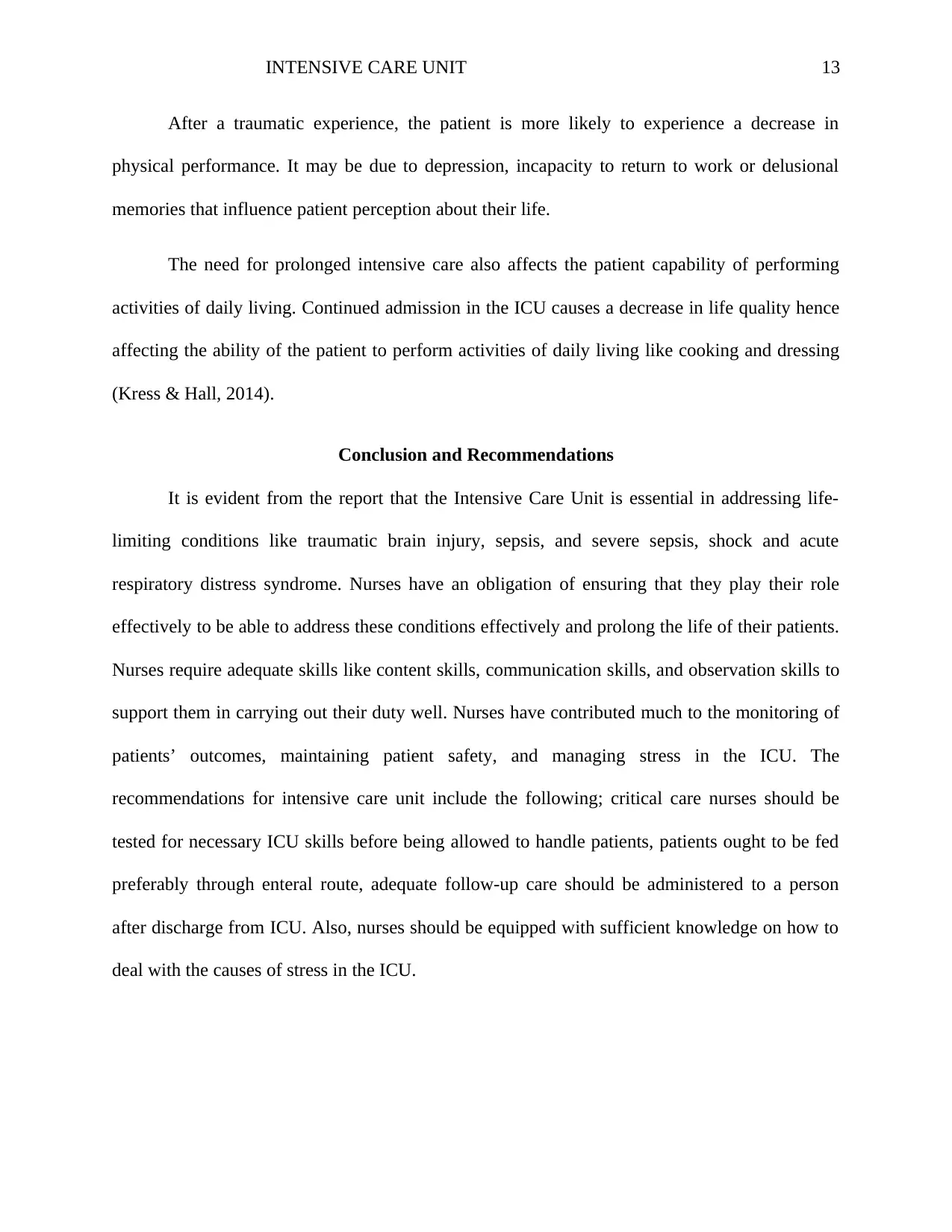
INTENSIVE CARE UNIT 13
After a traumatic experience, the patient is more likely to experience a decrease in
physical performance. It may be due to depression, incapacity to return to work or delusional
memories that influence patient perception about their life.
The need for prolonged intensive care also affects the patient capability of performing
activities of daily living. Continued admission in the ICU causes a decrease in life quality hence
affecting the ability of the patient to perform activities of daily living like cooking and dressing
(Kress & Hall, 2014).
Conclusion and Recommendations
It is evident from the report that the Intensive Care Unit is essential in addressing life-
limiting conditions like traumatic brain injury, sepsis, and severe sepsis, shock and acute
respiratory distress syndrome. Nurses have an obligation of ensuring that they play their role
effectively to be able to address these conditions effectively and prolong the life of their patients.
Nurses require adequate skills like content skills, communication skills, and observation skills to
support them in carrying out their duty well. Nurses have contributed much to the monitoring of
patients’ outcomes, maintaining patient safety, and managing stress in the ICU. The
recommendations for intensive care unit include the following; critical care nurses should be
tested for necessary ICU skills before being allowed to handle patients, patients ought to be fed
preferably through enteral route, adequate follow-up care should be administered to a person
after discharge from ICU. Also, nurses should be equipped with sufficient knowledge on how to
deal with the causes of stress in the ICU.
After a traumatic experience, the patient is more likely to experience a decrease in
physical performance. It may be due to depression, incapacity to return to work or delusional
memories that influence patient perception about their life.
The need for prolonged intensive care also affects the patient capability of performing
activities of daily living. Continued admission in the ICU causes a decrease in life quality hence
affecting the ability of the patient to perform activities of daily living like cooking and dressing
(Kress & Hall, 2014).
Conclusion and Recommendations
It is evident from the report that the Intensive Care Unit is essential in addressing life-
limiting conditions like traumatic brain injury, sepsis, and severe sepsis, shock and acute
respiratory distress syndrome. Nurses have an obligation of ensuring that they play their role
effectively to be able to address these conditions effectively and prolong the life of their patients.
Nurses require adequate skills like content skills, communication skills, and observation skills to
support them in carrying out their duty well. Nurses have contributed much to the monitoring of
patients’ outcomes, maintaining patient safety, and managing stress in the ICU. The
recommendations for intensive care unit include the following; critical care nurses should be
tested for necessary ICU skills before being allowed to handle patients, patients ought to be fed
preferably through enteral route, adequate follow-up care should be administered to a person
after discharge from ICU. Also, nurses should be equipped with sufficient knowledge on how to
deal with the causes of stress in the ICU.
Secure Best Marks with AI Grader
Need help grading? Try our AI Grader for instant feedback on your assignments.
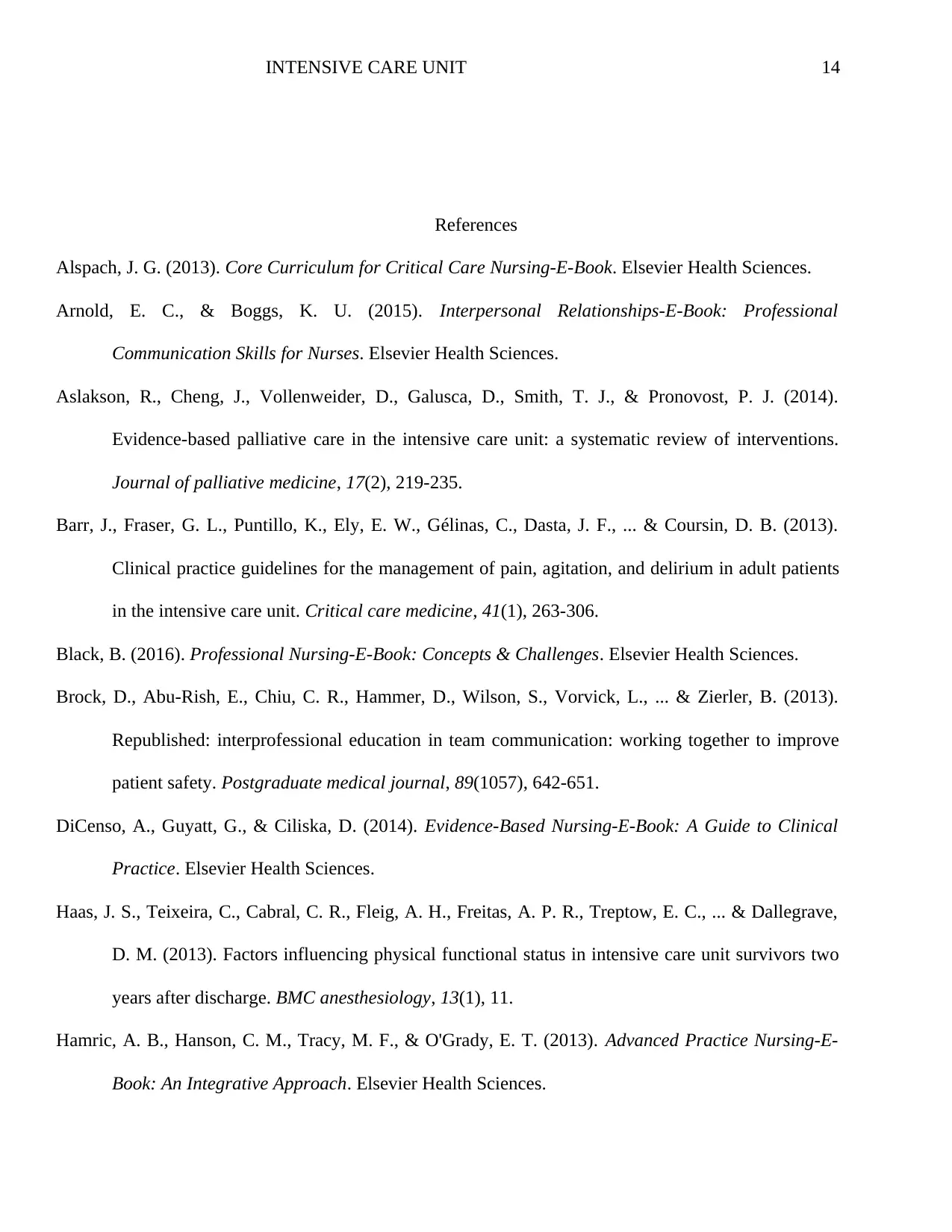
INTENSIVE CARE UNIT 14
References
Alspach, J. G. (2013). Core Curriculum for Critical Care Nursing-E-Book. Elsevier Health Sciences.
Arnold, E. C., & Boggs, K. U. (2015). Interpersonal Relationships-E-Book: Professional
Communication Skills for Nurses. Elsevier Health Sciences.
Aslakson, R., Cheng, J., Vollenweider, D., Galusca, D., Smith, T. J., & Pronovost, P. J. (2014).
Evidence-based palliative care in the intensive care unit: a systematic review of interventions.
Journal of palliative medicine, 17(2), 219-235.
Barr, J., Fraser, G. L., Puntillo, K., Ely, E. W., Gélinas, C., Dasta, J. F., ... & Coursin, D. B. (2013).
Clinical practice guidelines for the management of pain, agitation, and delirium in adult patients
in the intensive care unit. Critical care medicine, 41(1), 263-306.
Black, B. (2016). Professional Nursing-E-Book: Concepts & Challenges. Elsevier Health Sciences.
Brock, D., Abu-Rish, E., Chiu, C. R., Hammer, D., Wilson, S., Vorvick, L., ... & Zierler, B. (2013).
Republished: interprofessional education in team communication: working together to improve
patient safety. Postgraduate medical journal, 89(1057), 642-651.
DiCenso, A., Guyatt, G., & Ciliska, D. (2014). Evidence-Based Nursing-E-Book: A Guide to Clinical
Practice. Elsevier Health Sciences.
Haas, J. S., Teixeira, C., Cabral, C. R., Fleig, A. H., Freitas, A. P. R., Treptow, E. C., ... & Dallegrave,
D. M. (2013). Factors influencing physical functional status in intensive care unit survivors two
years after discharge. BMC anesthesiology, 13(1), 11.
Hamric, A. B., Hanson, C. M., Tracy, M. F., & O'Grady, E. T. (2013). Advanced Practice Nursing-E-
Book: An Integrative Approach. Elsevier Health Sciences.
References
Alspach, J. G. (2013). Core Curriculum for Critical Care Nursing-E-Book. Elsevier Health Sciences.
Arnold, E. C., & Boggs, K. U. (2015). Interpersonal Relationships-E-Book: Professional
Communication Skills for Nurses. Elsevier Health Sciences.
Aslakson, R., Cheng, J., Vollenweider, D., Galusca, D., Smith, T. J., & Pronovost, P. J. (2014).
Evidence-based palliative care in the intensive care unit: a systematic review of interventions.
Journal of palliative medicine, 17(2), 219-235.
Barr, J., Fraser, G. L., Puntillo, K., Ely, E. W., Gélinas, C., Dasta, J. F., ... & Coursin, D. B. (2013).
Clinical practice guidelines for the management of pain, agitation, and delirium in adult patients
in the intensive care unit. Critical care medicine, 41(1), 263-306.
Black, B. (2016). Professional Nursing-E-Book: Concepts & Challenges. Elsevier Health Sciences.
Brock, D., Abu-Rish, E., Chiu, C. R., Hammer, D., Wilson, S., Vorvick, L., ... & Zierler, B. (2013).
Republished: interprofessional education in team communication: working together to improve
patient safety. Postgraduate medical journal, 89(1057), 642-651.
DiCenso, A., Guyatt, G., & Ciliska, D. (2014). Evidence-Based Nursing-E-Book: A Guide to Clinical
Practice. Elsevier Health Sciences.
Haas, J. S., Teixeira, C., Cabral, C. R., Fleig, A. H., Freitas, A. P. R., Treptow, E. C., ... & Dallegrave,
D. M. (2013). Factors influencing physical functional status in intensive care unit survivors two
years after discharge. BMC anesthesiology, 13(1), 11.
Hamric, A. B., Hanson, C. M., Tracy, M. F., & O'Grady, E. T. (2013). Advanced Practice Nursing-E-
Book: An Integrative Approach. Elsevier Health Sciences.
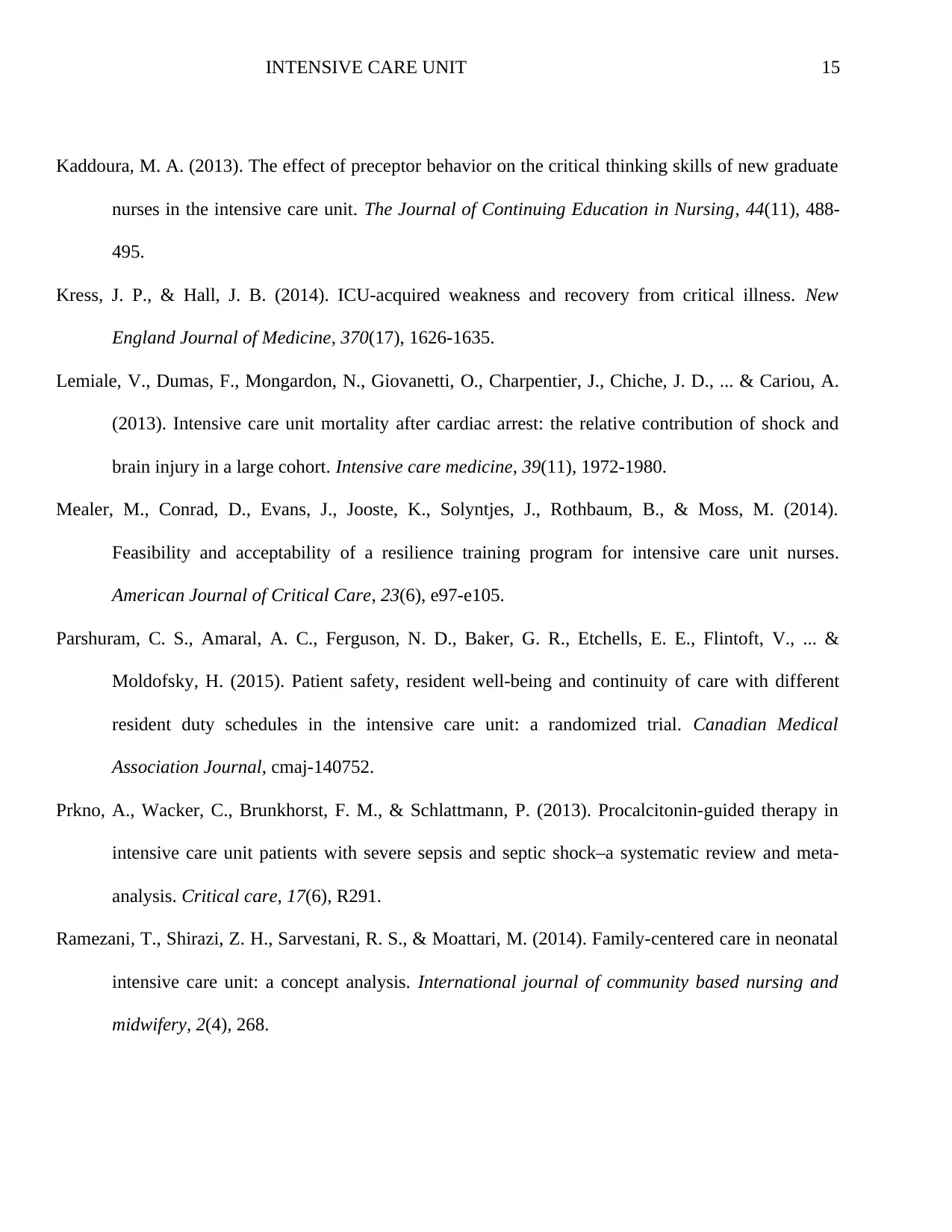
INTENSIVE CARE UNIT 15
Kaddoura, M. A. (2013). The effect of preceptor behavior on the critical thinking skills of new graduate
nurses in the intensive care unit. The Journal of Continuing Education in Nursing, 44(11), 488-
495.
Kress, J. P., & Hall, J. B. (2014). ICU-acquired weakness and recovery from critical illness. New
England Journal of Medicine, 370(17), 1626-1635.
Lemiale, V., Dumas, F., Mongardon, N., Giovanetti, O., Charpentier, J., Chiche, J. D., ... & Cariou, A.
(2013). Intensive care unit mortality after cardiac arrest: the relative contribution of shock and
brain injury in a large cohort. Intensive care medicine, 39(11), 1972-1980.
Mealer, M., Conrad, D., Evans, J., Jooste, K., Solyntjes, J., Rothbaum, B., & Moss, M. (2014).
Feasibility and acceptability of a resilience training program for intensive care unit nurses.
American Journal of Critical Care, 23(6), e97-e105.
Parshuram, C. S., Amaral, A. C., Ferguson, N. D., Baker, G. R., Etchells, E. E., Flintoft, V., ... &
Moldofsky, H. (2015). Patient safety, resident well-being and continuity of care with different
resident duty schedules in the intensive care unit: a randomized trial. Canadian Medical
Association Journal, cmaj-140752.
Prkno, A., Wacker, C., Brunkhorst, F. M., & Schlattmann, P. (2013). Procalcitonin-guided therapy in
intensive care unit patients with severe sepsis and septic shock–a systematic review and meta-
analysis. Critical care, 17(6), R291.
Ramezani, T., Shirazi, Z. H., Sarvestani, R. S., & Moattari, M. (2014). Family-centered care in neonatal
intensive care unit: a concept analysis. International journal of community based nursing and
midwifery, 2(4), 268.
Kaddoura, M. A. (2013). The effect of preceptor behavior on the critical thinking skills of new graduate
nurses in the intensive care unit. The Journal of Continuing Education in Nursing, 44(11), 488-
495.
Kress, J. P., & Hall, J. B. (2014). ICU-acquired weakness and recovery from critical illness. New
England Journal of Medicine, 370(17), 1626-1635.
Lemiale, V., Dumas, F., Mongardon, N., Giovanetti, O., Charpentier, J., Chiche, J. D., ... & Cariou, A.
(2013). Intensive care unit mortality after cardiac arrest: the relative contribution of shock and
brain injury in a large cohort. Intensive care medicine, 39(11), 1972-1980.
Mealer, M., Conrad, D., Evans, J., Jooste, K., Solyntjes, J., Rothbaum, B., & Moss, M. (2014).
Feasibility and acceptability of a resilience training program for intensive care unit nurses.
American Journal of Critical Care, 23(6), e97-e105.
Parshuram, C. S., Amaral, A. C., Ferguson, N. D., Baker, G. R., Etchells, E. E., Flintoft, V., ... &
Moldofsky, H. (2015). Patient safety, resident well-being and continuity of care with different
resident duty schedules in the intensive care unit: a randomized trial. Canadian Medical
Association Journal, cmaj-140752.
Prkno, A., Wacker, C., Brunkhorst, F. M., & Schlattmann, P. (2013). Procalcitonin-guided therapy in
intensive care unit patients with severe sepsis and septic shock–a systematic review and meta-
analysis. Critical care, 17(6), R291.
Ramezani, T., Shirazi, Z. H., Sarvestani, R. S., & Moattari, M. (2014). Family-centered care in neonatal
intensive care unit: a concept analysis. International journal of community based nursing and
midwifery, 2(4), 268.
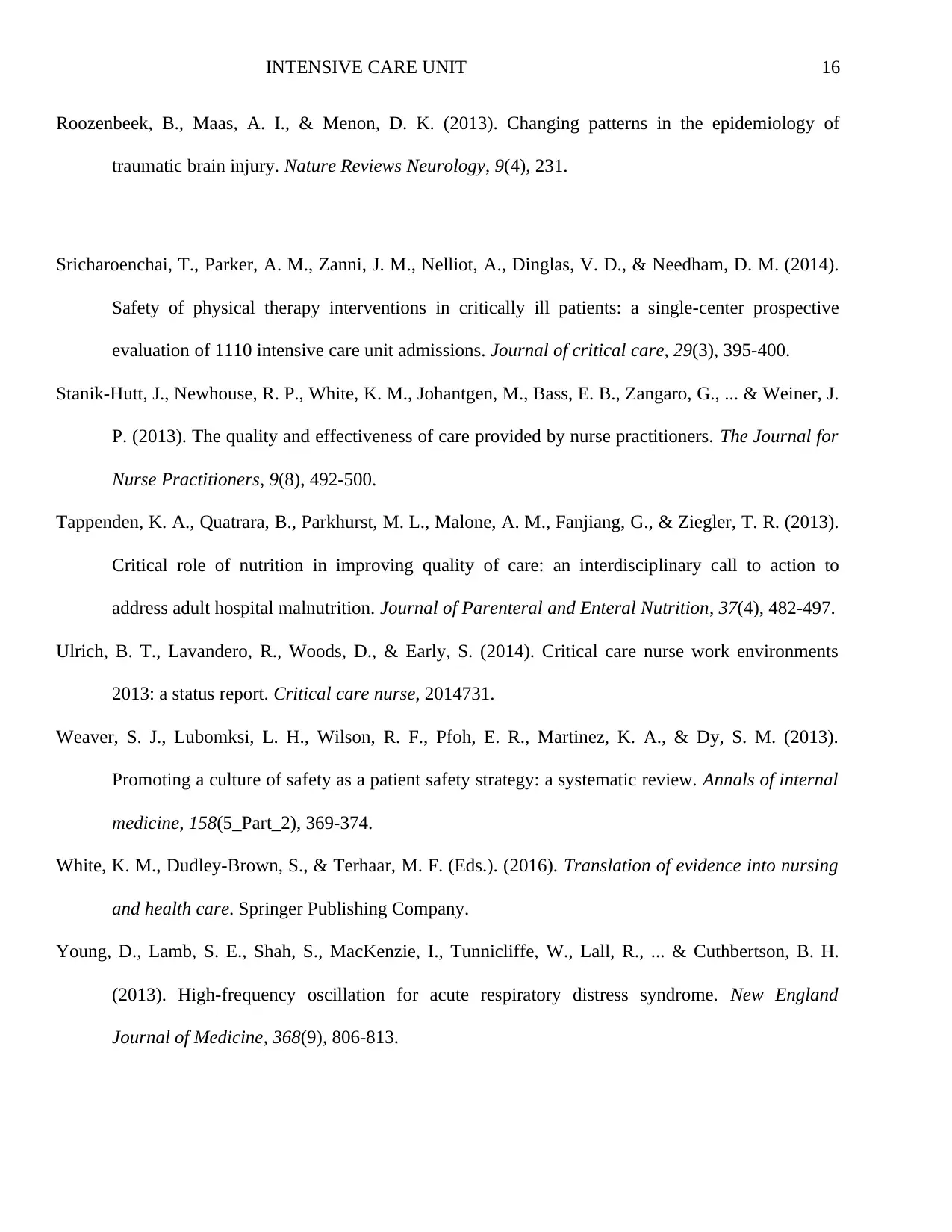
INTENSIVE CARE UNIT 16
Roozenbeek, B., Maas, A. I., & Menon, D. K. (2013). Changing patterns in the epidemiology of
traumatic brain injury. Nature Reviews Neurology, 9(4), 231.
Sricharoenchai, T., Parker, A. M., Zanni, J. M., Nelliot, A., Dinglas, V. D., & Needham, D. M. (2014).
Safety of physical therapy interventions in critically ill patients: a single-center prospective
evaluation of 1110 intensive care unit admissions. Journal of critical care, 29(3), 395-400.
Stanik-Hutt, J., Newhouse, R. P., White, K. M., Johantgen, M., Bass, E. B., Zangaro, G., ... & Weiner, J.
P. (2013). The quality and effectiveness of care provided by nurse practitioners. The Journal for
Nurse Practitioners, 9(8), 492-500.
Tappenden, K. A., Quatrara, B., Parkhurst, M. L., Malone, A. M., Fanjiang, G., & Ziegler, T. R. (2013).
Critical role of nutrition in improving quality of care: an interdisciplinary call to action to
address adult hospital malnutrition. Journal of Parenteral and Enteral Nutrition, 37(4), 482-497.
Ulrich, B. T., Lavandero, R., Woods, D., & Early, S. (2014). Critical care nurse work environments
2013: a status report. Critical care nurse, 2014731.
Weaver, S. J., Lubomksi, L. H., Wilson, R. F., Pfoh, E. R., Martinez, K. A., & Dy, S. M. (2013).
Promoting a culture of safety as a patient safety strategy: a systematic review. Annals of internal
medicine, 158(5_Part_2), 369-374.
White, K. M., Dudley-Brown, S., & Terhaar, M. F. (Eds.). (2016). Translation of evidence into nursing
and health care. Springer Publishing Company.
Young, D., Lamb, S. E., Shah, S., MacKenzie, I., Tunnicliffe, W., Lall, R., ... & Cuthbertson, B. H.
(2013). High-frequency oscillation for acute respiratory distress syndrome. New England
Journal of Medicine, 368(9), 806-813.
Roozenbeek, B., Maas, A. I., & Menon, D. K. (2013). Changing patterns in the epidemiology of
traumatic brain injury. Nature Reviews Neurology, 9(4), 231.
Sricharoenchai, T., Parker, A. M., Zanni, J. M., Nelliot, A., Dinglas, V. D., & Needham, D. M. (2014).
Safety of physical therapy interventions in critically ill patients: a single-center prospective
evaluation of 1110 intensive care unit admissions. Journal of critical care, 29(3), 395-400.
Stanik-Hutt, J., Newhouse, R. P., White, K. M., Johantgen, M., Bass, E. B., Zangaro, G., ... & Weiner, J.
P. (2013). The quality and effectiveness of care provided by nurse practitioners. The Journal for
Nurse Practitioners, 9(8), 492-500.
Tappenden, K. A., Quatrara, B., Parkhurst, M. L., Malone, A. M., Fanjiang, G., & Ziegler, T. R. (2013).
Critical role of nutrition in improving quality of care: an interdisciplinary call to action to
address adult hospital malnutrition. Journal of Parenteral and Enteral Nutrition, 37(4), 482-497.
Ulrich, B. T., Lavandero, R., Woods, D., & Early, S. (2014). Critical care nurse work environments
2013: a status report. Critical care nurse, 2014731.
Weaver, S. J., Lubomksi, L. H., Wilson, R. F., Pfoh, E. R., Martinez, K. A., & Dy, S. M. (2013).
Promoting a culture of safety as a patient safety strategy: a systematic review. Annals of internal
medicine, 158(5_Part_2), 369-374.
White, K. M., Dudley-Brown, S., & Terhaar, M. F. (Eds.). (2016). Translation of evidence into nursing
and health care. Springer Publishing Company.
Young, D., Lamb, S. E., Shah, S., MacKenzie, I., Tunnicliffe, W., Lall, R., ... & Cuthbertson, B. H.
(2013). High-frequency oscillation for acute respiratory distress syndrome. New England
Journal of Medicine, 368(9), 806-813.
Paraphrase This Document
Need a fresh take? Get an instant paraphrase of this document with our AI Paraphraser

INTENSIVE CARE UNIT 17
1 out of 17
![[object Object]](/_next/static/media/star-bottom.7253800d.svg)





